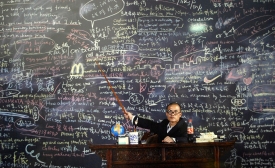china

This journal article by Zhao Kejin examines China's public diplomacy strategies, campaigns and global motivations to strengthen and secure its international public image.
As China’s global power grows, Beijing is learning that its image matters. For all its economic and military might, the country suffers from a severe shortage of soft power. According to global public opinion surveys, it enjoys a decidedly mixed international image. While China’s economic prowess impresses much of the world, its repressive political system and mercantilist business practices tarnish its reputation.
New Delhi -- Last month, in front of the Temple of Heaven in Beijing, Indian Prime Minister Narendra Modi and Chinese Premier Li Keqiang posed for Modi's smartphone and snapped a photo. "It's selfie time! Thanks Premier Li," Modi tweeted to his 13 million Twitter followers. The photo of the two men--together representing nearly 40 percent of the world's population--led the Wall Street Journal to wonder, "Did Modi Just Take the Most Powerful Selfie in History?"
Even as China’s activities in South China sea and the recent cyber attacks on the U.S. government systems have strained the U.S-China relations, China has reached out to the United States with an appeal to give up the path of “microphone diplomacy” and solve differences bilaterally through dialogue. It wanted the U.S to take up initiatives for creating conducive atmosphere to allow the successful U.S. visit by President Xi Jinping this year.
Joseph Nye is a University Distinguished Service Professor at Harvard University. He is also the former Dean of the John F Kennedy School of Government at Harvard, the Assistant Secretary of Defense under the Clinton administration from 1994-1995, and a current member of the Foreign Affairs Policy Board. He is the author of many books, most recently Is the American Century Over?
Following a speech at the University of Oxford in early June, he spoke with Samuel Ramani. That interview follows.
Themed "Feeding the Planet, Energy for Life", Expo Milano 2015 focuses on food and agriculture, with exhibitors presenting their respective food cultures while exemplifying the crucial role of building a "community of common destiny" for food security. Peking duck, Argentinian wine, Japanese sushi, Spanish ham... All the characteristic specialties represent the culinary culture of different nations. Food differs, but cuisines have something in common.
BEIJING — More than 140 years ago, the United States government designated Yellowstone as the nation’s first national park — an untouched Western landscape of geysers, grizzly bears and soaring peaks. The national parks program eventually expanded to include more than 450 sites and has become one of the country’s greatest tourist draws.
It is widely believed that although China’s hard power has increased tremendously in the last three decades, China’s soft power is still very limited. To some degree this is true. Very few big ideas come from Chinese thinkers; even the term ‘soft power’ itself is an American invention. Chinese leaders are well aware of this situation, and this is partly why the Chinese government in recent years has tried to promote China’s soft power through institutions like the Confucius Institutes and so on.







